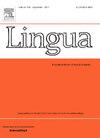英语世界网络话语中的粗俗
IF 1.3
3区 文学
0 LANGUAGE & LINGUISTICS
引用次数: 0
摘要
本文采用基于语料库的方法,基于全球网络英语语料库(GloWbE)对20个英语地区的网络交流中的粗俗语言进行了研究。粗俗识别将粗俗检测中使用的单词列表与正则表达式相结合,以识别包括拼写变体和模糊形式在内的各种粗俗元素。结果表明,与外圈和l2品种相比,内圈l1品种的网络低俗率呈显著趋势;结果还表明,内圈品种的适应校正类型符号比例较低,这表明内圈品种的使用者使用的英语粗俗形式比其他品种的使用者更多样化。此外,与一般的网络内容相比,博客数据中的粗俗更为普遍,这是一个普遍的语域差异。最后,结果表明,不同地区对特定的粗俗词源表现出偏好,爱尔兰喜欢fek,英国喜欢cunt,美国喜欢ass(hole)。研究结果表明,文化差异反映在对粗俗的特定地区偏好上,与外圈品种相关的规范接受相比,内圈品种所观察到的创造力与规范设定有关。本文章由计算机程序翻译,如有差异,请以英文原文为准。
Vulgarity in online discourse around the English-speaking world
This paper takes a corpus-based approach to study vulgar language in online communication across 20 English-speaking regions based on the Global Web-Based English Corpus (GloWbE). The identification of vulgarity combines word lists used in profanity detection with regular expressions to identify a wide range of vulgar elements including spelling variants and obscured forms. The results show a notable trend for inner circle L1-varieties to exhibit higher rates of vulgarity online compared to outer circle and L2-varieties. The results also show that inner circle varieties have lower adapted corrected type-token rations which indicates that inner circle variety speakers use more varied English vulgar forms compared with speakers from other circle varieties. In addition, there is a general register difference with vulgarity being more common in blog data compared with general web content. Finally, the results show that different regions exhibit preferences for specific vulgar lemmas feck being preferred in Ireland, cunt, in Britain, and ass(hole) in the United States. The findings are interpreted to show that cultural differences are reflected in region-specific preferences for vulgarity and that the creativity observed in inner circle varieties is linked to norm-setting compared to norm-reception associated with outer circle varieties.
求助全文
通过发布文献求助,成功后即可免费获取论文全文。
去求助
来源期刊

Lingua
Multiple-
CiteScore
2.50
自引率
9.10%
发文量
93
审稿时长
24 weeks
期刊介绍:
Lingua publishes papers of any length, if justified, as well as review articles surveying developments in the various fields of linguistics, and occasional discussions. A considerable number of pages in each issue are devoted to critical book reviews. Lingua also publishes Lingua Franca articles consisting of provocative exchanges expressing strong opinions on central topics in linguistics; The Decade In articles which are educational articles offering the nonspecialist linguist an overview of a given area of study; and Taking up the Gauntlet special issues composed of a set number of papers examining one set of data and exploring whose theory offers the most insight with a minimal set of assumptions and a maximum of arguments.
 求助内容:
求助内容: 应助结果提醒方式:
应助结果提醒方式:


